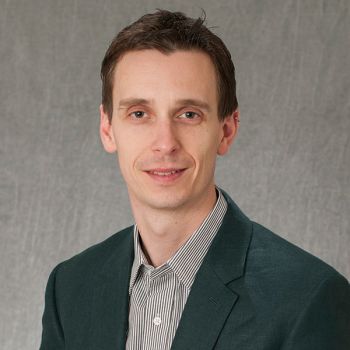
WASHINGTON (Aug. 28, 2017) — A research team at the George Washington University (GW) School of Medicine and Health Sciences will study the body’s natural defenses against HIV and look for ways to eliminate the infectious HIV reservoirs in the white blood cells of people taking antiretroviral therapy.
Millions of people, including children, live with HIV worldwide. The virus is particularly challenging to combat as it hides latent in immune system reservoirs; the immune system does not see it and therefore cannot work to fight it.
Brad Jones, PhD, assistant professor of microbiology, immunology, and tropical medicine at the GW School of Medicine and Health Sciences and senior author, was awarded a $2 million grant from the National Institute of Allergy and Infectious Diseases of the National Institutes of Health to conduct this research.
Previous studies have used artificial models of HIV latency, while this one relies on real white blood cells from patients with HIV who are receiving combination therapy.
“We are really trying to harness people’s own natural immune responses against the HIV virus,” Jones explained.
The study looks specifically at the “killer T-cells” in an individual’s immune system. These T-cells are an important part of the immune system with the function to kill HIV-infected cells. Previous studies have shown that the killer T-cells in different people have varying strengths, hence why some react better to therapies than others.
“We are trying to find out how to give the body’s immune response a boost and an edge so that these killer T-cells can do what they do best and kill these virus-infected cells,” said Jones.
Jones’ team will compare several killer T-cell samples to see which do better in eliminating HIV reservoirs. The results can provide guidance on how to develop better vaccines and immunotherapies pointing toward the ultimate goal of curing HIV.
Following this five-year study, the next step is to use the results to provide guidance to researchers conducting clinical trials and further development of therapeutic strategies.
The abstract for the study titled “CTL – Mediated Elimination of Replication Competent vs. Defective HIV Proviruses from Natural Latent Reservoirs: Roles of Antigen Specificity and Functional Characteristics” can be found at NIH RePORTER.


